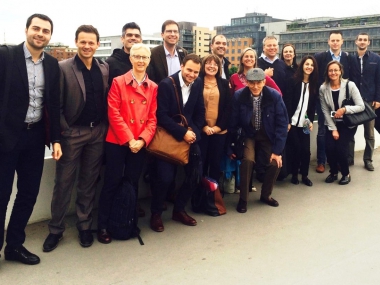Smart Impact in Dublin
Edited on
12 January 2018How do we get ready to be smart cities? This was the question being asked by the SmartImpact partners at their first meeting, hosted by Dublin City Council in June.

Using the smart city maturity model (developed by the Fraunhofer Institute), the partner cities mapped their current status based on the axis of innovation and organisational development from a traditional city development through to a full smart city. None of the partners have reached the latter state as yet but all are keen to work out ways that they can. The diversity showed how the SmartImpact cities have different learning goals and individual challenges.
The focus of the project is to look at how we can plan for smart through the lens of 5 key themes – (1) organisational development within the city administration; (2) financing and procurement of innovative and connected solutions; (3) activating the innovative ecosystem for smart districts; (4) supportive regulations and incentives and finally, (5) data integration. In a parallel process, each partner has set up a local group in their city to develop their own integrated action plan. The aim of the group is to integrate the learning from the network in to the city, producing a series of concrete actions i.e. a plan! Using the considerable collective experience of the group and that of Alanus von Radecki (Fraunhofer Institute) each plan will be subject to a "crash test" or peer review process with a "no holds barred" process of feedback and improvement.
Going forward SmartImpact will hold a series of meetings looking at each theme in detail. The first of these, Stockholm in October this year, will look at the role of local regulations and incentives in a smart city and how they can help to channel private investments in to technology based solutions that support sustainable development. For example, free parking /charging for electric vehicles, the use of open data standards, building requirements for connectivity. What was clear in Dublin was that the power of SmartImpact lies in our collective experience. The larger and more experienced cities of Dublin, Porto and Manchester bring excellent opportunities which the other cities can learn from. However the group has already seen how the smaller cities are leading the way. For example Guadalajara (ES) are leading the way the in data for city management, Miskolc with transport development and Smolyan's mayoral engagement.
Mirjana from Zagreb echoed the views of all the cities involved in SmartImpact when she said "working in the workshop with Porto yesterday was really inspiring for the Zagreb team. Our added value will be in creating something new to take this work forward in Europe".
To see more from the SmartImpact network see http://urbact.eu/smartimpact
Submitted by Caroline Creamer on
